Music Therapy
Connect Your Musical Interests With a Desire To Help Others
The music therapy major prepares you to work with a variety of clients in health care, education, and community settings. Besides essential music therapy classes, students also take courses in the areas of music, psychology, and neuroscience. Etown’s program prepares students for the ever-changing field of music therapy.
What Can I Do With a Degree in Music Therapy?
Music therapists use musical experiences to impact the lives of clients. A career in music therapy allows you to combine your love of music with a sincere interest in working with people. Credentialed music therapists use music to provide goal-directed music experiences including:
- Medical Contexts
- Extended Care
- Rehabilitative Care
- Schools
- Mental Health Organizations
- Veterans Organizations
- Hospice
Our students are sought after because of their exceptional extensive experiences in academic and practicum settings and their success in internships. You will engage clinical opportunities through the on-campus music therapy clinic and a variety of off-campus placements, from hospitals to schools to senior living communities. Etown music therapy students have some of the consistently highest pass rates on the Certification Board Music Therapy exam (CBMT) and are employed in jobs across the USA within 3 - 6 months of graduation. Etown graduates score 7-11 percentage points above the national mean across the four exam domains.
WANT TO KNOW MORE?
Lasting Legacy and Deep Experience
The Elizabethtown College music therapy program is one of the oldest music therapy programs in the country. As an Etown music therapy major, you will benefit from the clinical opportunities, alumni networks, and the reputation of a well-established program. Our music therapy faculty include a program director and more than eight clinical adjunct faculty who give you rich and diverse experiences in the field. With the variety of experiences of our clinical faculty, you will learn about practices that will leave you prepared with the knowledge of experienced professionals.
Become the Best of Who You Are
Our music therapy program is based upon strengths-based frameworks that seeks to develop your unique potential. We believe that each student offers different strengths and that our music therapy community is richer in our diversity. With our strength-based frameworks, you will explore your therapeutic self. We believe that a great therapist is someone who has explored the self, knows their strengths, and names areas they have yet to develop.
Audition for acceptance
Potential music majors are admitted to the program following a holistic audition and interview. Our music department is an accredited institutional member of the National Association of Schools of Music. The music major is directed through the Department of Music in the School of Arts and Humanities at Elizabethtown College.

Music Minor
A minor in music offers opportunities to acquire and develop skills in music theory, performance, music history, and literature. Students electing to minor in Music must consult with the Department Chair, who assigns a music faculty member to assess readiness for admission to the program.
We invite all prospective Music majors to join us on campus to meet the faculty, observe a class or performance and learn more about the auditions process.
Music Ensembles
Elizabethtown College offers a variety of ensembles. You do not have to be a Music major to participate in an ensemble, however you must be registered on Jayweb for the ensemble, either for credit or no-credit. With our ensembles, you will perform several times each year both on-and off-campus.
Instrumental Ensembles
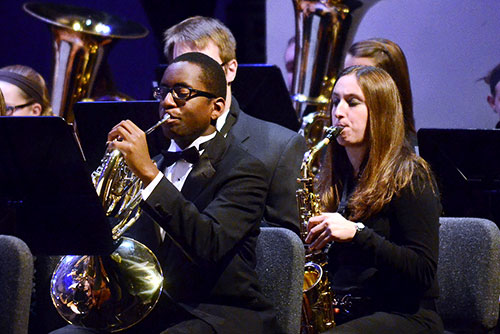
Symphonic Band
The Elizabethtown College Symphonic Band is the premier wind and percussion ensemble. The ensemble directed by Dr. Mark Yingling, performs a wide variety of quality musical literature from the wind band repertoire. Membership in the Symphonic Band is available to Elizabethtown College students of every academic major. No audition is required for membership. The Symphonic Band rehearses twice per week and performs at least one concert each semester. For more information regarding membership, email Dr. Yingling or contact by telephone at 717-361-1178.
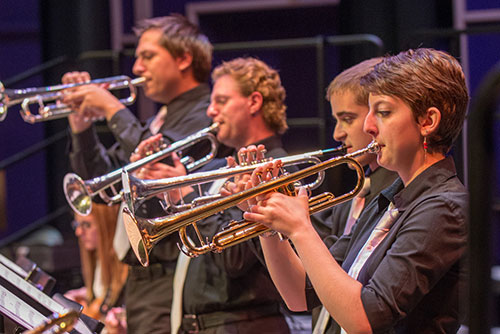
Jazz Band
The Jazz Band, directed by John Replogle, meets once each week for two hours and members may receive 1/2 credit. It is open to qualified students, with the approval of the director. It performs often during the academic year, both on- and off-campus, and offers students instruction in the basic skills of improvisation, stylization, and performance. For more information regarding membership, email John Replogle or contact by telephone at 717-361-1114.
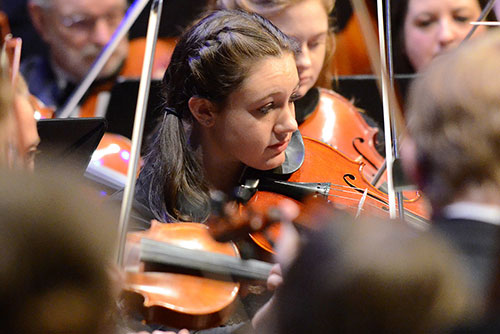
Orchestra
Founded in 1971, the Elizabethtown College-Community Orchestra (ECCO) is the premier wind, string, and percussion ensemble at Elizabethtown College. The ensemble, directed by Dr. Hayden Denesha, performs a wide variety of quality musical literature for both string orchestra and full orchestra. Membership is available to students of every academic major at Elizabethtown. There are no auditions required for community and college string players; community and College wind and percussion musicians gain membership in the ensemble with permission from the director. The orchestra performs at least one concert each semester. For more information regarding membership, email Dr. Denesha or contact by telephone at 717-361-1178.
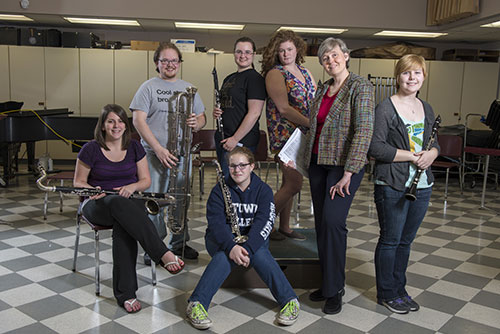
Chamber Ensembles
Chamber ensembles provide students opportunities to learn and perform works for small ensemble combinations. Musicians work to increase knowledge of chamber music repertoire and performance practice. The ensembles meet for approximately one hour weekly. Participants receive one-half hour credit per semester. Chamber groups include, but are not limited to:
- Arioso Flute Choir (Dr. Paula Nelson)
- Brass Ensemble (Grant Moore)
- Clarinet Ensemble (Faith Shiffer)
- Horn Ensemble
- Mixed Winds (Faith Shiffer)
- Percussion Ensemble (Brent Behrenshausen)
- Piano Ensemble (Dr. Justin Badgerow)
- Saxophone Ensemble (Faith Shiffer)
- String Ensemble (Laura Donall)
Occasionally mixed groups may also be formed, including guitar and voice. Auditions may be necessary for some groups.
Choral Ensembles
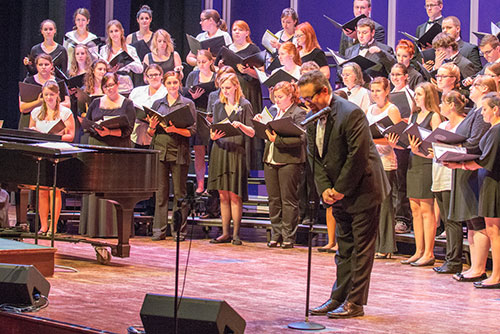
College-Community Chorus
The Elizabethtown College-Community Chorus is directed by Dr. Matthew Fritz, and is open to any member of the student body and local community without audition. Literature performed may include works from the standard choral repertoire, contemporary selections and music of varying cultures and periods. Students may enroll for one credit and earn Creative Expression core credit after four semesters or enroll for no credit with instructor permission.
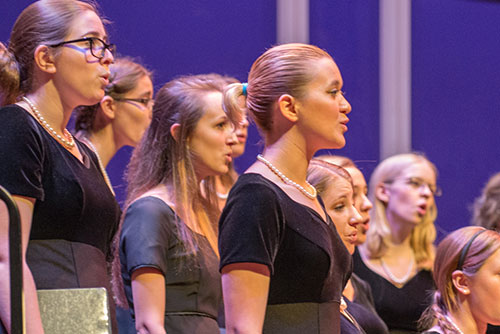
Fenice
Fenice is a gender-inclusive treble choir and is open to any member of the student body by audition. Literature performed may include works from the standard choral repertoire, contemporary selections, and music of varying cultures and periods. Students may enroll for one credit and earn Creative Expression core credit after four semesters or enroll for no credit with instructor permission. For more information regarding membership, email Michael McCarthy or contact by telephone at 717-361-1113.
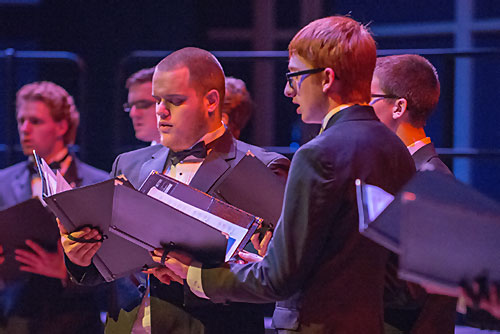
Sine Nomine
This vocal ensemble focuses on repertoire for the bass and tenor voices and is directed by Dr. Matthew Fritz. The ensemble is open to any member of the student body without audition. Literature performed may include works from the standard choral repertoire, contemporary selections, and music of varying cultures and periods.
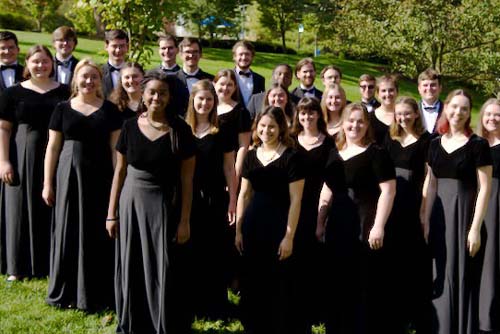
Concert Choir
Concert Choir, Dr. Matthew Fritz, director, is an auditioned group is Etown’s premier vocal ensemble. This 40-member, mixed-voice, touring ensemble has performed throughout the United States as well as internationally. International tours have included Ireland, Northern Ireland, Brazil, South Africa, and Wales. Auditions for the ensemble are held each spring for current students, and during Freshmen Orientation for new students. Students may enroll for one credit or enroll for no credit with instructor permission.
